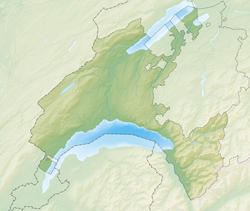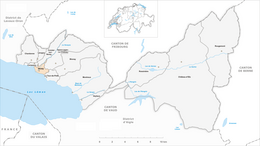Vevey, Switzerland
| Vevey | ||
|---|---|---|
 |
||
|
||
| Coordinates: 46°28′N 6°51′E / 46.467°N 6.850°ECoordinates: 46°28′N 6°51′E / 46.467°N 6.850°E | ||
| Country | Switzerland | |
| Canton | Vaud | |
| District | Riviera-Pays-d'Enhaut | |
| Government | ||
| • Executive |
Municipalité with 5 members |
|
| • Mayor |
syndic (list) Laurent Ballif (as of 2014) |
|
| • Parliament |
Conseil communal with 100 members |
|
| Area | ||
| • Total | 2.38 km2 (0.92 sq mi) | |
| Elevation | 383 m (1,257 ft) | |
| Population (Dec 2015) | ||
| • Total | 19,453 | |
| • Density | 8,200/km2 (21,000/sq mi) | |
| Postal code | 1800 | |
| SFOS number | 5890 | |
| Surrounded by | Corseaux, Corsier-sur-Vevey, La Tour-de-Peilz, Saint-Légier-La Chiésaz | |
| Website |
www Profile (French), SFSO statistics |
|
Vevey (French pronunciation: [vəvɛ]) is a town in Switzerland in the canton Vaud, on the north shore of Lake Geneva, near Lausanne.
It was the seat of the district of the same name until 2006, and is now part of the Riviera-Pays-d'Enhaut District. It is part of the French-speaking area of Switzerland.
Vevey is noted for being the final home of comedy legend Charlie Chaplin and his family from 1952 to 1977.
Vevey is home to the world headquarters of the food giant Nestlé, founded here in 1867. Milk chocolate was invented in Vevey by Daniel Peter in 1875.
A piloti settlement existed here as early as the 2nd millennium BC.
Under Rome, it was known as Viviscus or Vibiscum. It was mentioned for the first time by the ancient Greek astronomer and philosopher Ptolemy, who gave it the name Ouikos. In the Middle Ages it was a station on the Via Francigena. It was then ruled by the bishopric of Lausanne, and later under the Blonay family.
Vevey lived through a period of prosperity after the Vaud Revolution of 1798. In the 19th century industrial activities included mechanical engineering at the Ateliers de Constructions Mécaniques de Vevey, food (Nestlé) and tobacco (Rinsoz & Ormond).
...
Wikipedia




